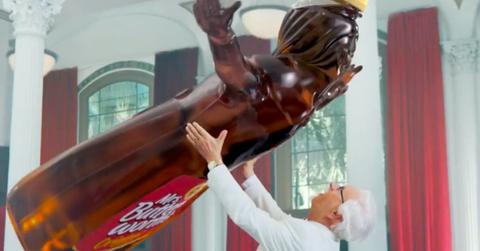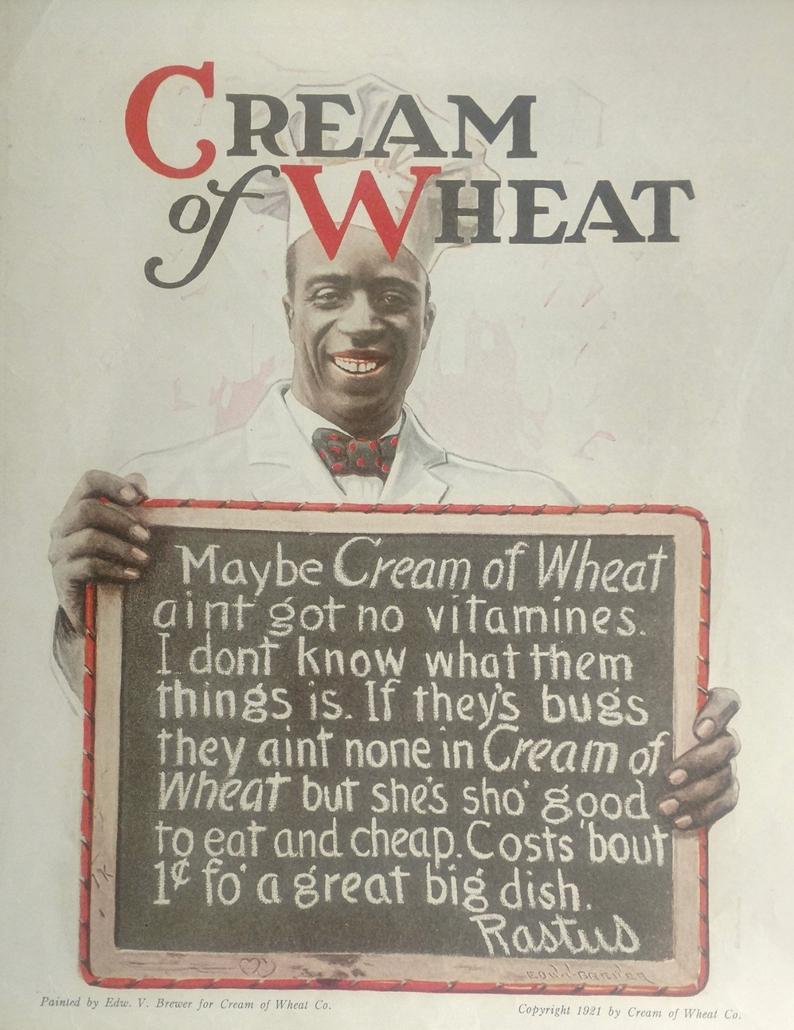People Really Want to Know the Ethnicity of Syrup Icon Mrs. Butterworth
Updated June 17 2020, 12:50 p.m. ET

Here's a sentence you probably thought you'd never hear: breakfast syrup is now becoming a controversial topic. Aunt Jemima is remixing its logo and name. Quaker Oats, the company that produces the saccharine pancake topping and Super Troopers food challenge of choice acknowledges "Aunt Jemima's origins are based on a racial stereotype."
The issue now has people wondering about one of Aunt Jemima's competitors: is Mrs. Butterworth white?
Cream of Wheat definitely has some racist advertisement history.
While it's not immediately apparent that Mrs. Butterworth is tapping into any harmful stereotypes, Rastus, the grinning chef on the Cream of Wheat box, definitely is.
Emery Mapes from the North Dakota Diamond Milling Co. created the logo in 1893 and settled on the countenance of a Black chef. How progressive, right?
Well, not exactly. It was clear that Rastus was the butt of a joke, a caricature meant to perpetuate the racist imagery of an uneducated Black man. Probably the best example of this is a 1921 ad that depicts the chef holding up a chalkboard of rudimentary writing: "Maybe Cream of Wheat aint got no vitamines. I dont know what them things is. If they’s bugs they aint none in Cream of Wheat but she's sho' good to eat and cheap. Costs 'bout 1 cent fo' a great big dish."

Is Mrs. Butterworth white?
Personally, I always equated Mrs. Butterworth with the granny from Looney Tunes, Mrs. Doubtfire, or any old white woman that faints after the camera cuts to her in a key comedic scene in a forgettable '80s comedy. So I always assumed that she is.
And the truth is, yes, Mrs. Butterworth is white. In fact, one could argue that people who thought she was black were... kinda racist themselves.
The first TV ads for Mrs. Butterworth featured the breakfast symbol as an elderly white woman. Cliff Arquette and then, down the line, Mary Kay Bergman, lent their talents to the Butterworth commercials. The kids in those things always looked a little too jazzed for someone who just discovered their waffle topping is a sentient being, and no one seemed to question just what happened when her syrup ran out.
There are a few reasons some people thought Mrs. Butterworth was Black. One: it's easy to conflate the Butterworth brand with Aunt Jemima. Both are breakfast syrups featuring women. While Aunt Jemima uses "Mammy" imagery in order to sell its products, Mrs. Butterworth simply used someone who looked like they could be an old school headmistress, or some town grandma that holds her purse in front of her with two hands and walks with quick little steps.
Another reason is that the Butterworth bottle is transparent, and some just assumed, because syrup is brown, that must mean Mrs. Butterworth is a Black woman. Then you have others who argue that, if Mrs. Butterworth is a maid, then whoever came up with her design must certainly have imagined her as either a maternal house slave or Southern Black maid.
There are claims that the Mrs. Butterworth bottle was modeled after Gone With the Wind actress Thelma McQueen, but they haven't been substantiated. Again, the earliest adverts for the syrup clearly depict the sentient food appropriating the persona of an old white woman.
This isn't the first time Mrs. Butterworth has become the subject of controversy. Back in 2012, the University of Missouri gave one of its food service workers an award for on-the-job excellence. The trophy? A gold spray-pained bottle of Mrs. Butterworth. Some folks complained that the move was racist, but Calvin Rolark, the Black food supervisor who came up with the idea, didn't think so. A Mrs. Butterworth bottle was chosen because it resembled an Academy Award.
Director of diversity and outreach at MU School of Medicine, Traci Wilson-Kleekamp stated, "It’s inappropriate to give our lowest-paid employees an award representing being a faithful slave," in an interview with the Columbia Daily Tribune.
Deputy Chancellor Mike Middleton didn't think so, "You can’t jump the gun on all of these issues. Everything is going to offend somebody."